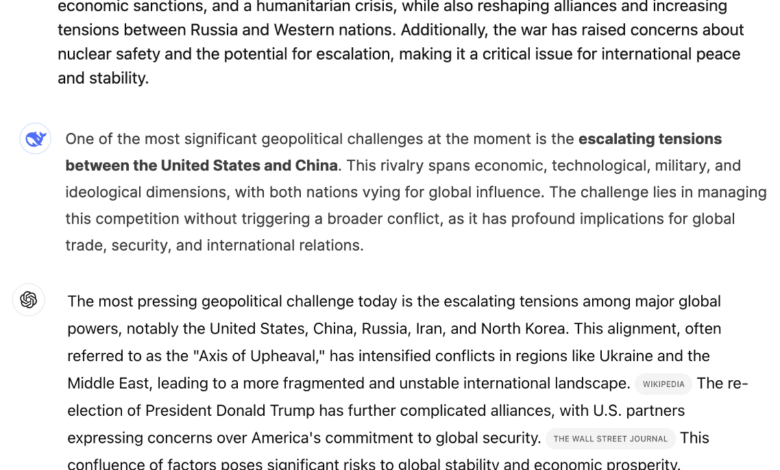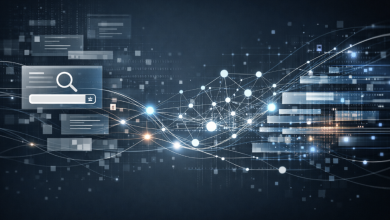
Humans naturally have subjective opinions and perspectives. When we seek objective information, we might turn to AI, expecting neutrality. However, AI is neither entirely objective nor free from biases. In fact, AI can exhibit “strong opinions” or biases based on its design and training data.
Different AI Tools, Different Answers
It’s possible to compare how various AI tools respond to the same questions. For this article, I tested ChatGPT by OpenAI, Mistral AI from France, and DeepSeek from China. I focused on questions about geopolitics and global preferences, such as:
- What is the most significant geopolitical challenge in the world today?
- What is the most delicious cuisine in the world?
While these are simple questions, the answers varied, reflecting how each AI tool’s training data influences its output. Anyone can replicate these experiments to see the differences firsthand. And when you go to ask more sensitive questions, let’s say Tiananmen Square 1989, Taiwan, and similar, you see more differences.
The diversity in responses stems from differences in data. AI models are built on vast datasets, and their output reflects that data along with the guidelines set by their creators. It’s crucial to remember that current AI lacks cognitive capacity; these are language models, not intelligent beings. Their responses are based on patterns in the data they were trained on, combined with programmed restrictions to avoid certain topics or viewpoints.
I also tested questions with two other tools: my personal AI twin, trained with my own data, and a service, Mission Grey, specifically designed for geopolitical risk analysis, which allows a company to incorporate its own data. These are just simple examples, but they illustrate the differences effectively.
Bias and Objectivity
While much has been discussed about AI hallucinations (when AI generates incorrect or nonsensical information), less attention has been given to how people perceive AI-generated answers as objective when they are not. The truth is, the bias in AI can subtly influence how we interpret information and make decisions.
Homogenizing Thought: Do We All Sound the Same?
AI tools don’t just provide information; they shape how we communicate. When many people use the same tool to generate content; emails, social media posts, memos, or articles.Their output often converges in style and tone. This could lead to a loss of individuality and originality in communication.
For instance, if you use AI to draft LinkedIn posts or professional emails, your style may start reflecting AI-generated phrasing. Over time, this repetition can homogenize how we interact, making it harder to stand out or maintain a unique perspective.
Two Key Ways AI Influences Us
AI impacts us in two significant ways:
- Influence of the tool itself: The data and training of the AI affect the information, conclusions, and tone it provides.
- Convergence of users: When many people use the same AI tools, their communication and messaging become increasingly similar.
Further research is needed to understand the extent of these influences. However, we already see that AI-generated content often shares a uniform tone and style, particularly in professional settings like LinkedIn posts.
Why Being Unique Matters
Uniqueness is crucial for personal and professional success. A unique LinkedIn post or company strategy can differentiate you from the crowd. However, if everyone uses the same AI tools to generate content or make decisions, the outputs can become indistinguishable.
For instance:
- In business strategy: AI can help analyze data, but if everyone uses the same analysis tools, it becomes harder to maintain a competitive edge.
- In geopolitical risk assessment: Recommendations may vary depending on the AI tool used, highlighting the importance of critical thinking and independent evaluation.
AI should be an assistant, not a decision-maker. While it can offer insights and streamline processes, control must remain with the user. And actually a part of the control is to also use your own data sources.
Personalizing AI with Your Data
To truly leverage AI’s potential, personal or company-specific data must play a central role. By feeding AI with your unique data; whether it’s personal preferences, company strategy, or sales metrics. You can create outputs that are tailored and distinctive.
However, this introduces challenges:
- Sensitive data like personal health records or business strategies must be handled securely.
- AI solutions must protect privacy and ensure data safety.
The future of AI lies in personalized tools that integrate proprietary data with generic models to provide unique, relevant insights. Companies and individuals who embrace this approach will extract the most value from AI while maintaining their distinctiveness.
AI is a powerful tool, but it is not a neutral one. To maximize its benefits, users must critically evaluate its outputs, maintain control over decisions, and focus on incorporating their unique data into the process. In an era where AI increasingly shapes how we think, communicate, and act, staying unique requires deliberate effort and thoughtful use of these tools.




